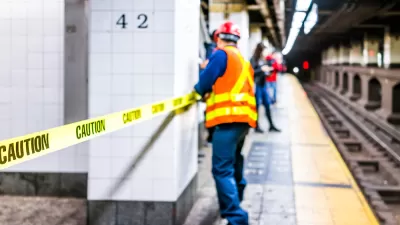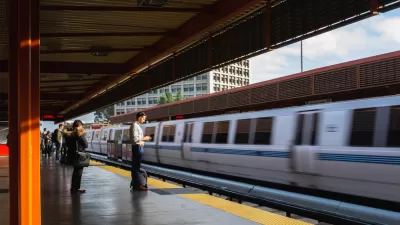It's like March 2020 all over again.

“With subway, bus and commuter railroad ridership still far below pre-pandemic levels, the MTA is burning through billions of dollars in emergency federal aid earlier than expected,” reports Jose Martinez for The City sharing information made public by Metropolitan Transportation Authority (MTA) officials this week. The article echoes talk of fiscal crisis that was an early sign of the fundamental changes the Covid-19 pandemic would bring in early 2020, with several repeated episodes every few months through the duration of the pandemic. Neither federal relief packages nor the Infrastructure Investment and Jobs Act have been sufficient to fix the fundamental structural deficits of transit funding in New York City (and other cities around the country).
“The MTA has long held that more than $15 billion in one-time federal COVID relief funds would allow the agency to balance its budgets through 2025. But officials now concede that early-pandemic projections of commuters returning in larger numbers were way off the mark — which could have a painful impact on riders, transit workers and ballooning MTA deficits.”
The MTA commissioned a projection from consultants at McKinsey & Company that predicted “new normal” levels of transit ridership to rebound at 80 percent to 92 percent of pre-pandemic levels. Transit ridership is currently stuck at 60 percent of the 7 million daily trips taken on the MTA system in 2019, explains Martinez.
The ongoing issue of expensive capital projects certainly doesn’t help the budget deficit. The day after Martinez’s report about the fiscal crisis at the MTA, a tweet showing the cost of making Broadway Junction accessible is estimated at $384.8-$474.1 million made the rounds as evidence of the MTA’s poor spending practices. The MTA missed a state-mandated deadline to account for its high costs of transit capital improvements in 2021.
With high capital investments costs in one hand and a lack of fare revenue in the other, the MTA is seeking help from the state to make ends meet, according to a separate article on the same subject from Dave Colon for Streetsblog NYC. To prevent fare hikes, service cuts or layoffs, the MTA would need to spend less of its federal pandemic aid beginning next year, stretching out the rescue money until 2028 and lowering the remaining deficits to $1.6 billion a year from 2024 to 2028, according to Colon. “Doing so, however, also would require Albany to find a new revenue stream for the agency that could cover a $795 million deficit in 2023 and $1.6 billion deficits for each of the following five years.”
According to Colon, MTA officials are asking the state to treat mass transit funding more like a service when deciding budget equations—depending less on fare revenues to balance the budget.
FULL STORY: MTA Already Looking Over ‘Fiscal Cliff’ as Federal Funds Near End of Line

Maui's Vacation Rental Debate Turns Ugly
Verbal attacks, misinformation campaigns and fistfights plague a high-stakes debate to convert thousands of vacation rentals into long-term housing.

Planetizen Federal Action Tracker
A weekly monitor of how Trump’s orders and actions are impacting planners and planning in America.

San Francisco Suspends Traffic Calming Amidst Record Deaths
Citing “a challenging fiscal landscape,” the city will cease the program on the heels of 42 traffic deaths, including 24 pedestrians.

Adaptive Reuse Will Create Housing in a Suburban Texas Strip Mall
A developer is reimagining a strip mall property as a mixed-use complex with housing and retail.

Study: Anti-Homelessness Laws Don’t Work
Research shows that punitive measures that criminalized unhoused people don’t help reduce homelessness.

In U.S., Urban Gondolas Face Uphill Battle
Cities in Latin America and Europe have embraced aerial transitways — AKA gondolas — as sustainable, convenient urban transport, especially in tricky geographies. American cities have yet to catch up.
Urban Design for Planners 1: Software Tools
This six-course series explores essential urban design concepts using open source software and equips planners with the tools they need to participate fully in the urban design process.
Planning for Universal Design
Learn the tools for implementing Universal Design in planning regulations.
Heyer Gruel & Associates PA
JM Goldson LLC
Custer County Colorado
City of Camden Redevelopment Agency
City of Astoria
Transportation Research & Education Center (TREC) at Portland State University
Jefferson Parish Government
Camden Redevelopment Agency
City of Claremont





























